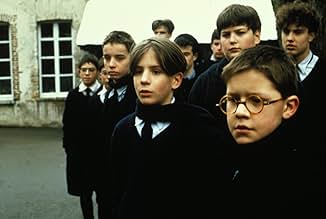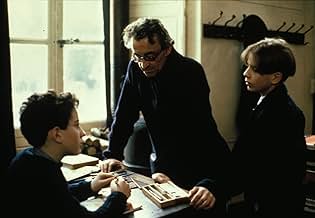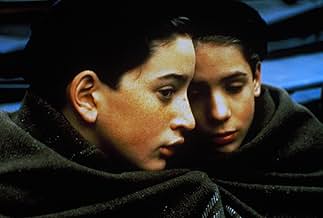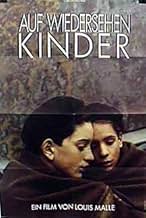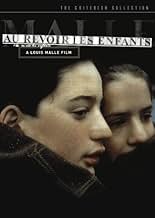VALUTAZIONE IMDb
8,0/10
37.603
LA TUA VALUTAZIONE
In un collegio francese durante la seconda guerra mondiale, arriva un nuovo studente. Diventa il compagno di stanza del miglior studente della sua classe. All'inizio rivali, i compagni di st... Leggi tuttoIn un collegio francese durante la seconda guerra mondiale, arriva un nuovo studente. Diventa il compagno di stanza del miglior studente della sua classe. All'inizio rivali, i compagni di stanza formano un legame e condividono un segreto.In un collegio francese durante la seconda guerra mondiale, arriva un nuovo studente. Diventa il compagno di stanza del miglior studente della sua classe. All'inizio rivali, i compagni di stanza formano un legame e condividono un segreto.
- Regia
- Sceneggiatura
- Star
- Candidato a 2 Oscar
- 28 vittorie e 12 candidature totali
Stanislas Carré de Malberg
- François Quentin
- (as Stanislas Carré De Malberg)
Luc Etienne
- Moreau
- (as Luc Étienne)
Recensioni in evidenza
An elegantly crafted tale of friendship, compassion & boyhood, Au Revoir Les Enfants is a heartbreaking, poignant & tragic cinema that's actually based on the events which took place during the childhood of this film's director and is an endearing portrait of life at school, student rivalry & beauty of friendship.
Set in France during the final years of the Second World War, the events of Au Revoir Les Enfants takes place in a Catholic boarding school and is narrated through the eyes of Julien Quentin; one of the students at the school. The plot covers his relationship with a newly arrived enigmatic student with whom he's at odds at first but the two learn to get along & share a big secret.
Directed by Louis Malle, the film is nicely crafted with many details beautifully captured by its calmly moving camera. The screenplay tries to get an authentic vibe of education in Catholic schools, the conversations between its characters carry the childlike innocence & the performances by its cast, especially the child actors, becomes more captivating as the story progresses.
On an overall scale, Au Revoir Les Enfants (also known as Goodbye Children) isn't in anyway a hard-hitting or emotionally scarring cinema but the gentle manner in which it depicts its premise really makes you care for its characters, makes you wish they get away, makes you wish for a miracle & although its subject matter has been dealt in a better manner, the film is worthy of a watch for its two main characters alone.
Set in France during the final years of the Second World War, the events of Au Revoir Les Enfants takes place in a Catholic boarding school and is narrated through the eyes of Julien Quentin; one of the students at the school. The plot covers his relationship with a newly arrived enigmatic student with whom he's at odds at first but the two learn to get along & share a big secret.
Directed by Louis Malle, the film is nicely crafted with many details beautifully captured by its calmly moving camera. The screenplay tries to get an authentic vibe of education in Catholic schools, the conversations between its characters carry the childlike innocence & the performances by its cast, especially the child actors, becomes more captivating as the story progresses.
On an overall scale, Au Revoir Les Enfants (also known as Goodbye Children) isn't in anyway a hard-hitting or emotionally scarring cinema but the gentle manner in which it depicts its premise really makes you care for its characters, makes you wish they get away, makes you wish for a miracle & although its subject matter has been dealt in a better manner, the film is worthy of a watch for its two main characters alone.
Au Revoir Les Enfants (1987)
A wrenching, sensitive, all-too-true drama set in a gorgeous French wooded outpost during World War II. The main actors are boys, and they play their parts with unusual conviction, unexaggerated but with intensity. And the anti-Semitism that arises, though inevitable in Nazi territory, comes subtly and really stings. The movie isn't complete without this horror, but the horror is made complete by the really vivid recreation of this kind of private boys school--a period movie at its best.
Director Louis Malle has not only a message, but a sensitive feel for the medium--for making fluid the flow and background of the plots of his films. It's also a fairly complex mix of types, and you can somehow keep them all straight as it goes--as straight as you are meant to as the facts unfold. In the end, it confirms a familiar story of Nazi terror, but one that can't be told too often.
A wrenching, sensitive, all-too-true drama set in a gorgeous French wooded outpost during World War II. The main actors are boys, and they play their parts with unusual conviction, unexaggerated but with intensity. And the anti-Semitism that arises, though inevitable in Nazi territory, comes subtly and really stings. The movie isn't complete without this horror, but the horror is made complete by the really vivid recreation of this kind of private boys school--a period movie at its best.
Director Louis Malle has not only a message, but a sensitive feel for the medium--for making fluid the flow and background of the plots of his films. It's also a fairly complex mix of types, and you can somehow keep them all straight as it goes--as straight as you are meant to as the facts unfold. In the end, it confirms a familiar story of Nazi terror, but one that can't be told too often.
In 1944, the upper class boy Julien Quentin (Gaspard Manesse) and his older brother François travel to the Catholic boarding school in the countryside after vacations. Julien is a leader and good student and when the new student Jean Bonnet (Raphael Fejtö) arrives in the school, they have friction in their relationship.
However, Julien learns to respect Jean and discovers that he is Jewish and the priests are hiding him from the Nazis. They become best friends and Julien keeps the secret of the origins of Jean. When the priest Jean (Philippe Morier- Genoud) discovers that the servant Joseph (François Négret) is stealing supplies from the school to sell in the black market, he fires the youth. Sooner the Gestapo arrives at school to investigate the students and the priests that run and work in the boarding school.
"Au Revoir les Enfants" is an awarded film written and directed by Louis Malle apparently based on true events during World War II in the boarding school where he studied. The touching story of friendship and betrayal is beautiful and sad, and the boys have great performances. Louis Malle highlights the despicable behavior of collaborators and traitor and the most impressive, the German soldiers are tough but respectful with the French civilians. My vote is eight.
Title (Brazil): "Adeus, Meninos" ("Goodbye, Boys")
However, Julien learns to respect Jean and discovers that he is Jewish and the priests are hiding him from the Nazis. They become best friends and Julien keeps the secret of the origins of Jean. When the priest Jean (Philippe Morier- Genoud) discovers that the servant Joseph (François Négret) is stealing supplies from the school to sell in the black market, he fires the youth. Sooner the Gestapo arrives at school to investigate the students and the priests that run and work in the boarding school.
"Au Revoir les Enfants" is an awarded film written and directed by Louis Malle apparently based on true events during World War II in the boarding school where he studied. The touching story of friendship and betrayal is beautiful and sad, and the boys have great performances. Louis Malle highlights the despicable behavior of collaborators and traitor and the most impressive, the German soldiers are tough but respectful with the French civilians. My vote is eight.
Title (Brazil): "Adeus, Meninos" ("Goodbye, Boys")
"More than 40 years have passed, but I'll remember every second of that January morning until the day I die."
Part of what makes this autobiographical film from Louis Malle so powerful is that a big portion of its coming of age material is universal. In a Catholic boarding school we see hazing and random bullying while ineffectual headmasters look the other way, bedwetting, reading after hours, playground battles, curiosity about girls, and the kind of childhood events that get remembered for life, like getting lost in the woods. In other words, it's just boys trying to get through the difficulties of growing up, and really could be any group of boys, at any time.
But of course this isn't just any period, it's occupied France during WWII, and while the school full of affluent kids seems mostly insulated from that, danger lurks. Three new boys who have been admitted and given new names are secretly Jews, a fact which gradually becomes known by Julien, one of the smarter students (Gaspard Manesse, playing the young Malle). He has a rivalry and a friendship with one of the new boys (played soulfully by Raphaël Fejtö), and the nuances of their relationship not only felt authentic, but it made it hard to know how the film would play out.
I love the dimensions of the film, including the differing Catholic responses to the Jewish issue in Vichy France - some good, some bad. There is also an axis of rich/poor, and I loved the sermon where the priest shocks the visiting parents by criticizing the behavior of the wealthy. Lastly, the use of the Chaplin film 'The Immigrant' (1917) within the film is pitch perfect, and a masterful touch.
Part of what makes this autobiographical film from Louis Malle so powerful is that a big portion of its coming of age material is universal. In a Catholic boarding school we see hazing and random bullying while ineffectual headmasters look the other way, bedwetting, reading after hours, playground battles, curiosity about girls, and the kind of childhood events that get remembered for life, like getting lost in the woods. In other words, it's just boys trying to get through the difficulties of growing up, and really could be any group of boys, at any time.
But of course this isn't just any period, it's occupied France during WWII, and while the school full of affluent kids seems mostly insulated from that, danger lurks. Three new boys who have been admitted and given new names are secretly Jews, a fact which gradually becomes known by Julien, one of the smarter students (Gaspard Manesse, playing the young Malle). He has a rivalry and a friendship with one of the new boys (played soulfully by Raphaël Fejtö), and the nuances of their relationship not only felt authentic, but it made it hard to know how the film would play out.
I love the dimensions of the film, including the differing Catholic responses to the Jewish issue in Vichy France - some good, some bad. There is also an axis of rich/poor, and I loved the sermon where the priest shocks the visiting parents by criticizing the behavior of the wealthy. Lastly, the use of the Chaplin film 'The Immigrant' (1917) within the film is pitch perfect, and a masterful touch.
In this spellbinding film, Louis Malle is able to evoke the fear and sadness some children suffer while away from home at a boarding school, the loneliness. Yet he doesn't dwell on sentimentality but only skims it, instead peppering the scenes with the bravura and faux assertiveness of adolescents. Malle and the actors adroitly juggle circumstances and emotions. Ultimately, they capture a terrifying time in history through the eyes and uncertainty of boys who aren't as grown-up as they'd like to think.
The two main characters, Julien Quentin and Jean Bonnet, are beautifully portrayed by two very capable and talented young actors. The supporting cast is equally impressive. The film is directed with a touch of genius, and holds its own when compared to another motion picture masterpiece, To Kill a Mockingbird.
The two main characters, Julien Quentin and Jean Bonnet, are beautifully portrayed by two very capable and talented young actors. The supporting cast is equally impressive. The film is directed with a touch of genius, and holds its own when compared to another motion picture masterpiece, To Kill a Mockingbird.
Lo sapevi?
- QuizBased on an incident from Louis Malle's own youth. Julien is modeled after Malle.
- BlooperWhen hiking, Julien asks what day it is and is told that it's Thursday, January 17th, 1944. That date was actually a Monday.
- Curiosità sui creditiPour Cuotemoc, Justine et Chloé. (opening credits)
I più visti
Accedi per valutare e creare un elenco di titoli salvati per ottenere consigli personalizzati
- How long is Au Revoir les Enfants?Powered by Alexa
Dettagli
- Data di uscita
- Paesi di origine
- Sito ufficiale
- Lingue
- Celebre anche come
- Au Revoir les Enfants
- Luoghi delle riprese
- Aziende produttrici
- Vedi altri crediti dell’azienda su IMDbPro
Botteghino
- Lordo Stati Uniti e Canada
- 4.542.825 USD
- Lordo in tutto il mondo
- 4.575.613 USD
- Tempo di esecuzione1 ora 44 minuti
- Colore
- Mix di suoni
- Proporzioni
- 1.66 : 1
Contribuisci a questa pagina
Suggerisci una modifica o aggiungi i contenuti mancanti

Divario superiore
By what name was Arrivederci ragazzi (1987) officially released in India in Hindi?
Rispondi
![Guarda Bande-annonce [VOST]](https://m.media-amazon.com/images/M/MV5BZDlkMTI5OTgtNmU4My00MzRjLWFkNzMtYmMyMDlhNjQ2OTFmXkEyXkFqcGdeQXRyYW5zY29kZS13b3JrZmxvdw@@._V1_QL75_UX500_CR0)
